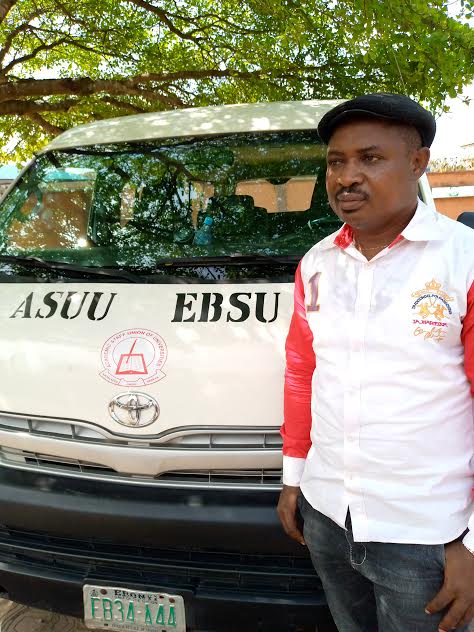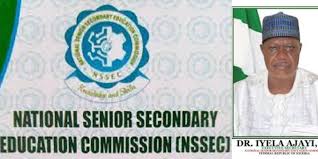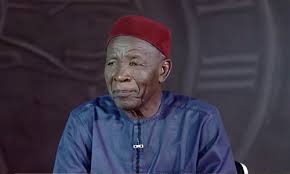
ASUU faults student loan scheme, seeks improved varsity funding
The Student Loan Program has drawn criticism from the Academic Staff Union of Universities' Ebonyi State University Chapter, which claims that its sustainability and realisation are unsustainable.
However, the Union demanded that its objectives be renegotiated in order to achieve greater financing for revitalisation, university autonomy, and academic freedom throughout all of the country's universities.
This was said on Monday at a news conference held in the state capital of Abakaliki by Dr. Ikechuku Igwenyi, the Chairman of the EBSU-ASUU Chapter.
"As you are all aware, underfunding and successive governments have plagued Nigeria's education system," he stated. As a result, Nigeria's public basic and secondary schools have been demolished, and the instructors who taught there have extremely low self-esteem because they are among the lowest paid public personnel in the country—the majority make less than $20 a month.
In Nigeria, a large number of children have moved from public schools to privately run primary and secondary schools, where they are exploited in the name of providing "quality" education. This is a shameful and tragic scenario. It appears that higher education institutions are now in the firing line after successfully demolishing the basic education system.
"ASUU has pledged to oppose this anomaly, which is precisely the rationale for their demands for renewed negotiations, increased funds for revitalisation, academic freedom, and university autonomy.
"A number of diversionary policies, including the non-payment of Earned Academic Allowances, the imposition of IPPIS, the forceful introduction of CCMAS, the obnoxious notional promotion clauses, the threat to Union Leaders for their public advocacy, the unchecked proliferation of state and private universities when there is no funding capacity, and a host of other measures, have truncated these fundamental problems of our university education system." The Student Loan Scheme is the subject of today's tale.
Speaking further, Igwenyi linked the military administration of Yakubu Gowon to the inception of the student loan program. He pointed out that the program was created to assist children in financing their education if the civil war had an impact on their parents' or guardians' enterprises.
Remember that the Students Loan Board was founded by General Yakubu Gowon (Rtd) in 1972 as part of the post-Civil War recovery measures following the war's conclusion. This was intended to ease parents and guardians whose companies were impacted by the civil war and assist students in the nation with financing their education. The program cost millions of Naira, and the military government faced several difficulties in repaying the money. After more than ₦46 million in loans were disbursed, more than ₦40 million was not recouped. What would happen if that amount was used to finance postsecondary education?
Later, in 1993, the Nigerian Education Bank was founded by Decree No. 50 of 1993 in response to the need to provide financial assistance to students, but due to the complexity of implementation and recovery, it was not implemented till Gen. Ibrahim Badamosi Babangida (Rtd) stepped aside.”
It wasn't until 2022 that the Bill for an Act to "provide for easy access to Higher Education for Nigerians through Interest-free Loans from the Nigerian Education Bank"—sponsored by Hon. Femi Gbajabiamila, the Leader of the House of Representatives under Gen. Muhammadu Buhari (Rtd)—saw the light of day. The Students' Loan Bill—renamed the "Access to Higher Education Bill"—was approved by the Senate and the House of Representatives.
President Bola Tinubu has officially signed the NELFUND Student Loan, also known as the Access to Higher Education Act, 2023. Among the amended requirements are that students provide information such as their NIN and Bank BVN and pledge to return the debt within two years of completing NYSC, with the possibility of loan forgiveness in the event of death of the beneficiary.”
He continued by saying that ASUU has a duty to properly inform the public about the student loan program, which has caused a great deal of controversy.
"ASUU has a duty to properly inform the public on this matter," he said. It is depressing that the individuals responsible for bringing back this offensive practice of financing education through individual loans are our leaders, who themselves benefited from free and heavily subsidised education both in Nigeria and outside. Education is a public benefit that the state is required to provide for. Why is it so hard to intervene in public tertiary institutions with funds intended for an already-failed enterprise and establish the institutions' financial independence by providing the necessities for an operational education system with local content?
"Keep in mind that the government had through thorough engagements with stakeholders agreed to inject N1.3 trillion as a consequence of the NEEDS Assessment Report of 2012 for turn-around maintenance of tertiary institutions in Nigeria. This was to reduce the financial pressure on the Government, create Research Institutes for research and innovations, provide basic learning infrastructures, build hostels to remove students from town effects and make tuition affordable, and create opportunities for improved internally generated revenue among other benefits.
"The Federal Government pledged to release ₦220 billion a year for five years, ending in 2018, after releasing ₦200 billion in 2013." Not a single full tranche has been revealed to date, with the exception of the initial tranche that was made public in 2013 by the administration of President Goodluck Jonathan. Part of the problems that ASUU is fighting to solve is this; the Union has seen multiple Memoranda of Understandings and Memoranda of Agreements signed by the Government that lack integrity.
The majority of the contemporary buildings and infrastructure seen in all of Nigeria's public universities, polytechnics, and colleges of education and agriculture are the result of a single ₦200 billion donation made in 2013. ASUU expressed discomfort with several aspects of the student loan program, including the family income threshold, the initial disbursement ratio between the institution and the candidate, the source of funding, the repayment plan, and the high taxes and tariffs imposed on businesses in a depressed economy where jobs are not guaranteed and are unavailable after youth service.





